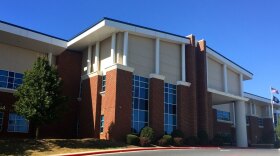Following President Trump’s decision to sharply restrict the number of refugees allowed into the United States, the State Department has informed refugee resettlement offices nationwide to trim operations or even close. One of those offices is in Harrisonburg, which has a long history of refugee resettlement. WMRA’s Jessie Knadler takes a look at how the new policy is affecting Rockingham County.
It’s not called “the Friendly City” for nothing.
Harrisonburg’s general open-mindedness, low cost of living and high employment in industries that don’t demand English, such as food production, have allowed the city to resettle from 175 to 200 refugees every year.
But the feds recently informed some 40 refugee resettlement offices nationwide to cut back their operations, according to Reuters. Twenty are expected to close.
JIM HERSHBERGER: Yeah, I am worried.
Jim Hershberger runs the resettlement office for Church World Service in Harrisonburg. Church World Service is one of nine agencies nationwide that contracts with the federal government to resettle refugees. He says ten branches of those agencies nationwide have already closed. Although there are no plans for the Harrisonburg office to close as of yet, it hasn’t had a single refugee arrival in two months since mid-February.
JIM HERSHBERGER: We’re doing maybe a third or so of what we’d done in the last several years. [10:32]
The Trump Administration’s ceiling for refugee arrivals this year is 45,000, down from 110,000 in years past. Stalled processing within the State Department suggests the total number for the year could be even lower. Just over 17,000 refugees have been admitted to the U.S. since October. If numbers don’t pick up, Hershberger says he will have a hard time staying open.
HERSHBERGER: I am worried that we won’t have the money to continue to offer services to refugees like we like to do. I am worried that people here who have friends in refugee camps, who were actually adjudicated for arrival in this country by the State Department, all that’s kind of put on hold now.
Church World Service is funded by the federal government to help recent arrivals find jobs and apartments, and to enroll them in English classes, driving classes, and their children into school. The aim is to integrate quickly. Without funding, he’s concerned that won’t happen. And those stalled in camps overseas may languish even longer.
The restrictions have impacted refugees already trying to make it in Rockingham County.
HERSBHERGER: They feel a little more unsettled. Just makes people feel a little more, eh, are we really safe here? Will they come and pick us up sometime because we’re refugees, right?
Volunteers and churches want to help but Hershberger says he has no arriving families to send them. So his office is trying to pivot. They’re putting more emphasis on helping arrivals who have professional backgrounds – teachers and doctors -- become re-credentialed in the U.S. so they can keep working in their chosen profession.
HERSHBERGER: We do have to help people find jobs. It’s not just that initial job working, say, packing herbs with Shenandoah Growers or in one of the poultry plants, but find something that is closer to what they were doing.
The changes are being felt at the poultry plants too. Poultry is a big industry in Rockingham County and long considered a pipeline for immigrants and refugees. Two years ago, the workforce at the Perdue plant in Bridgewater was 42 percent immigrant, according to its Director of Operations Kenneth Lambert.
KENNETH LAMBERT: Our countries are made up of Mexico, El Salvador, Guatamala, Honduras, Cuba, Colombia, Dominican Republic, Iraq, Syria, Somalia, Bosnia, Russia, Kenya and right now we have a couple of people from Uganda.
But last month, a Perdue spokesman confirmed that refugee applicants to the Bridgewater plant have dwindled significantly, and that the company is filling positions from the local community.
Fewer refugee arrivals may impact local schools as well.
It’s really where the city’s status as a melting pot comes to life. Students in city public schools come from 51 foreign countries and speak more than 56 languages.
Because Harrisonburg High has long been overcrowded, plans are underway for a second high school. But when asked if fewer refugees arrivals have eased the overcrowding, school administrators didn’t want to comment.





